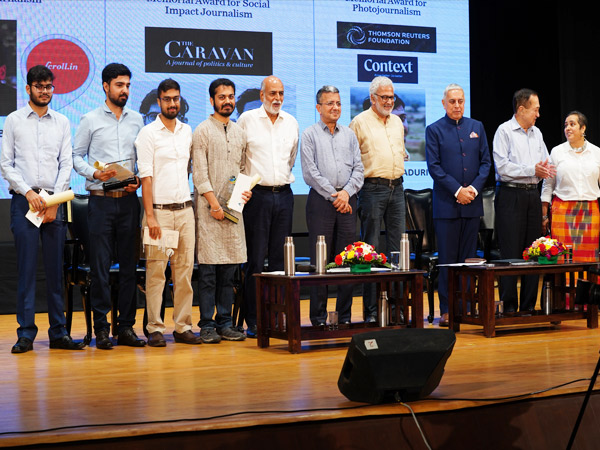Neel Madhav and Alishan Jafri won the K P Narayana Kumar Memorial Award for Social Impact Journalism 2022 for their work ‘Clicks and Bait: How a constellation of far-right Hindi YouTubers determine what you see on your TV’ published in The Caravan magazine. Madhav and Jafri’s in-depth reportage uncovers the ugly truth behind the manipulation of mainstream media narratives by right-wing amateur youtubers. Their work is a powerful reminder of the social responsibility that comes with journalism.The final jury comprising Ruben Banerjee (Chairperson), Jayalakshmi Shreedhar and V. Krishna Ananth chose the winners from shortlisted entries.
The award, which comprises a trophy, a citation and INR 100,000/- in prize money, was presented to the winner by the Chief Guest Chander Uday Singh, Senior Advocate, Supreme Court of India,, at the Convocation of the ACJ Class of 2023.
The jury’s citation read as follows:
“The first place among the entries shortlisted for social impact journalism goes to Neel Madhav and Alishan Jafri for their story Clicks and Bait: How a constellation of far-right YouTubers determine what you see on your TV. Madav and Jafri illustrate how we live in an age where YouTube news channels expose a growing number of audiences to online hate speech. Their work exemplifies studies that show that the more toxic the news content the more users engage with it and the longer it lives, only to soon leap at you from your TV screen.
The award is for many things. It is for their lucid unpacking of the osmosis between click-bait stories on social media and mainstream news reporting. It is for diligent detailing, evident in the way Madhav and Jafri interleave their narrative with case study after case study.
Clicks and Bait walks us through alleyways of Palika Bazar, Shaheen Bhag and Ghaziabad where YouTubers seem to fashion the news as much as they report it. Madhav and Jafri give us a ringside view of how street corner exchanges are set up and then ferried across digital media platforms masquerading as slice-of-life reportage and ending up as breaking news on television screens. In the course of this journey they show how hateful news content polarizes and radicalizes consumers of information and is setting ever-newer lows in public discussions.”
Other stories that were considered as final nominations and have been awarded special mentions by the jury (in no particular order) are as follows:
- Andrew Fidel Fernando | Fiftytwo.in – Hunger | A journey into Sri Lanka’s agricultural heartlands as the economy nosedives.
- Sarita Santoshini | Fiftytwo.in – Uprooted | Residential schools for indigenous people have a long and dark history around the world. In this in-depth reported piece, Sarita Santoshini examines the underreported issue of how residential schools have changed the lives of young Adivasi people and their communities in Odisha’s mining-interest regions.
- K. Sivanandan | Malayala Manorama – ‘Stop doing this to our children’– A journalist shines the spotlight in a series on the debilitating difficulties faced by children with learning disabilities, bringing them hope and recognition from the judiciary and the state.
- Parth Nikhil | People’s Archive of Rural India – This series of six articles examined healthcare (or the lack of it) and injustice meted out to some of the most marginalised people in India. The idea behind the series was to highlight how an already dilapidated public health system was never enough to deal with a raging pandemic. And when the pandemic struck, it made an already terrible situation worse.



